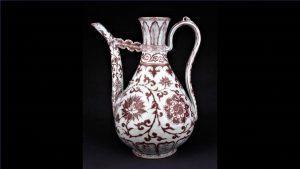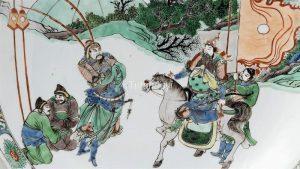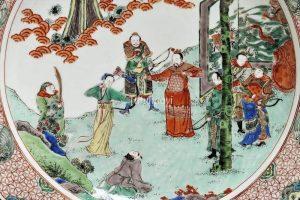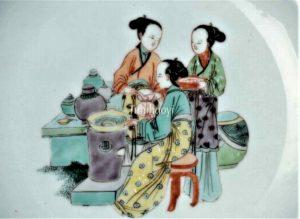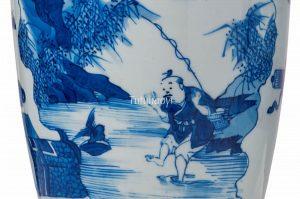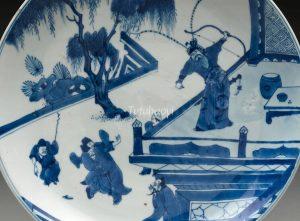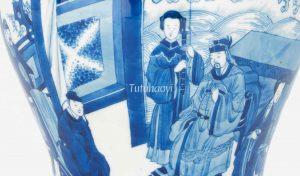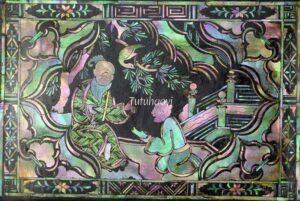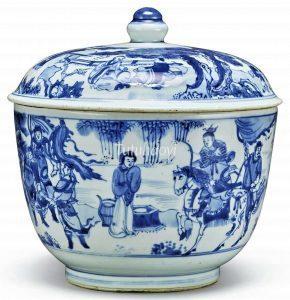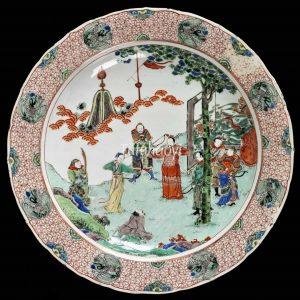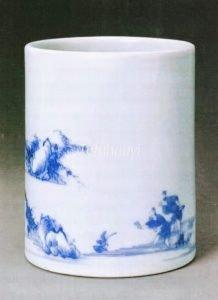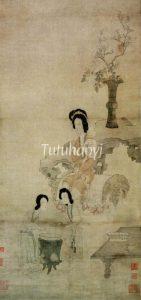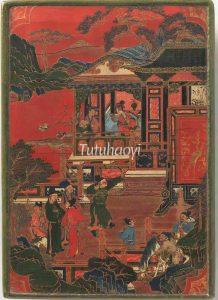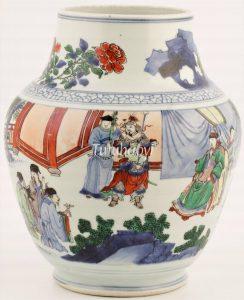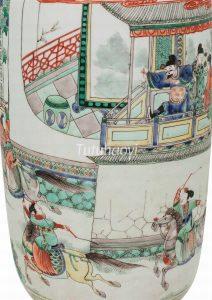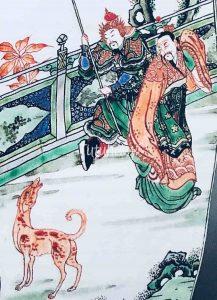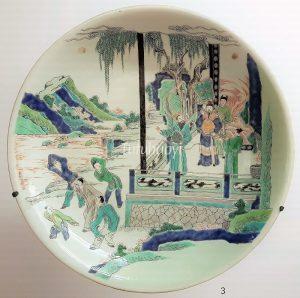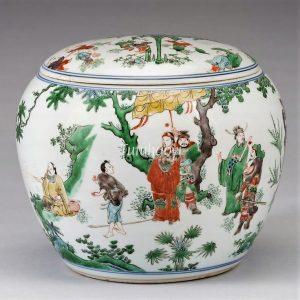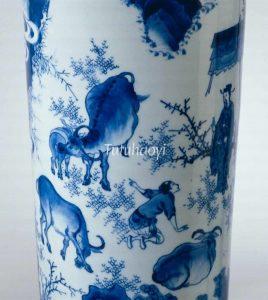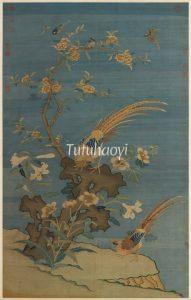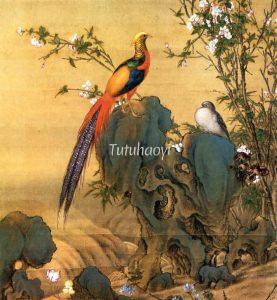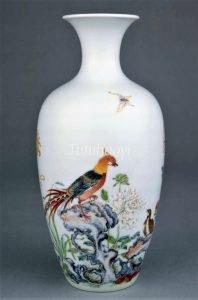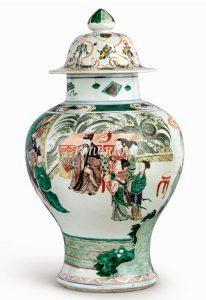Showing Results Containing
Hongwu porcelain with underglaze blue and underglaze red decoration has been the treasure from the beginning of Ming Dynasty which was established by Emperor Taizu Zhu Yuanzhang.
General Guo Ziyi deterring the mighty enemy has been a famous event in ancient China around mid-8th century. Deciphering this story scene on Chinese porcelain plates and tiles, however, has not been straightforward and has taken iconography specia...
Congratulations on art historian Dr Yibin Ni’s new research into a rare story scene in Chinese pictorial art, which may have puzzled contemporary museum curators and porcelain collectors. Dr Ni has traced the art historical context in which this r...
Pictorial artworks with figural scenes in traditional China often have historical and cultural significance and are not to be mistaken for daily life genre painting. Here is an example and Dr Yibin Ni will explain to you the hidden meaning in the ...
People who are not familiar with Chinese history and parables may have the impression that the above image is a genre painting of fisherman’s daily life. But in fact, there is more meaning to it. Dr Yibin Ni will explain the story in detail and ho...
Story scenes painted on Chinese porcelains are sometimes mysterious and challenging to understand. Dr Yibin Ni, whose specialised research is to demystify figures and story scenes, and decode motifs, symbols and pun rebuses in Chinese art, is here...
Have you wondered why the same story scenes were painted differently on Chinese artworks? How was it painted to present women falling in love on Chinese antique porcelains? Read on to see what Dr Yibin Ni has to say with his analysis.
Have you ever seen such an image and wondered why a young man is holding a shoe and kneeling down in front of an old man? Is there any historical event relating to the shoe and such scene? Read on to see how Dr Yibin Ni deciphers the figures and s...
This scene was from a popular play ‘The Story of the White Hare’ (Bai Tu Ji 白兔记) and was much admired during the Ming dynasty.
Liu Zhiyuan 刘知远, the hero of the play set during the turbulent Five Dynasties (907–960), became an orphan when he was a teenager. His affluent neighbour looked after him and later...
Guo Ziyi (郭子仪 697–781), posthumously bestowed the title Prince Zhongwu of Fenyang (汾阳忠武王) because of his birth place and his contribution to the court, was the greatest Tang-dynasty general. He played the key role in military campaigns against the Uyghur Khaganate and Tibetan Empire, enemies constantly threatening China ...
This is a story of a brave woman who boldly exercised her rhetorical competence, managed to correct the erring ruler and saved her husband from execution. The story of The Wife of the Bow Maker in the State of Jin (晋弓工妻) is recorded in Chapter 6 Convincing and Perceptive (辩通传), Biographies of Exemplary Women (列女...
The story scene refers to an old Chinese saying: in the fight between the sandpiper and the clam, the fisherman has the best of it. This parable came from an ancient Chinese text entitled ‘Strategies of the Warring States (战国策 Zhanguo Ce)’. The book contains anecdotes of diplomacy and warfare during the Warring ...
‘Tiao Mei He Geng 调梅和羹’ is a metaphor that likens the art of governing a country to the adequate seasoning of a stew with salt and sour prunes. The scene is often made up of a group of women or men surrounding a stove, on which a cauldron of food is being cooked, with an assistant holding a container with sour p...
Li Yuan (李渊 566–635 CE) excelled at horse-riding, archery, and calligraphy as a young man. He was to be the future founder (reigned 618–626 CE) of the Tang dynasty (618–907 CE). Miss Dou was exceptionally smart and her father Dou Yi 窦毅, the governor of Dingzhou, was very particular about the quality of his future son-in-...
The story scene is originated from an anecdote dating back to the Tang dynasty (618-907). Cui Rong (崔戎, 780-835) is a statesman who is important enough to have a position in the ‘Biographies’ section in the official histories The Old Book of Tang (jiu tang shu 旧唐书), completed in 945, and the New Book of Tang (
Emperor Yang of the Sui dynasty (隋炀帝, r. 606-18) is known for many achievements, such as linking the Yellow and Yangzi Rivers with the man-made Grand Canal, leading successful military campaigns expanding the Sui territory, and being accomplished in the arts. Despite those, Emperor Yang is also considered to have brought...
When the old duke of Jin (晋) passed away, his heir was still in the cradle. It was with the powerful minister Zhao Dun (赵盾)’s support that he succeeded in ascending the throne. Unfortunately, the young duke, who was posthumously given the title Duke Ling of Jin, Jìn Líng Gōng (晋灵公, ? – 607 BCE), became increasingly the o...
The young duke of the State of Jin (晋) who was posthumously given the title Duke Ling of Jin, Jìn Líng Gōng (晋灵公, ? – 607 BCE), has been known as a ‘ruler who does not deserve his title (bu jun 不君)’. His despotic behaviour was enumerated in the records by historiographers. For example, he levied heavy taxes to b...
When the Baron of the Zhou vassal state (周西伯) did a divination with oracle bones for his imminent hunting trip, the message came: ‘You will not catch a small bear or a large bear, but a teacher will be presented to you by the divine power.’ After bathing and fasting for three days, the baron arrived at the River Wei, he ...
When Bing Ji (丙吉 d. 55 BCE) was a chancellor in the Han court, once he encountered the aftermath of a gang fight in the street. Bing Ji passed them without batting an eyelid. Further ahead, a buffalo passed and it looked out of breath. Bing Ji had its owner stopped and inquired about the buffalo’s heavy panting. Bing Ji’...
The zhi pheasant 雉, also called Huachong 华虫 in ancient China, is one of the most popular birds depicted in traditional Chinese art. Due to its characteristic multicoloured long-tail, the pheasant is associated with the wide-ranging literary talents of the emperor. It is also used in pun rebus pictures, as ‘z...
Pun Design: Quail + Long-tailed Continue Reading
With strategic plans to restore the war-torn country back to order, the talented scholar Li Jing (李靖) was paying a visit to the powerful Lord Yang Su (杨素), who enjoyed luxurious ways of living and female company around him. To Li Jing’s disappointment, Lord Yang did not take his plans seriously. However, Red Fly Whisk (红...
